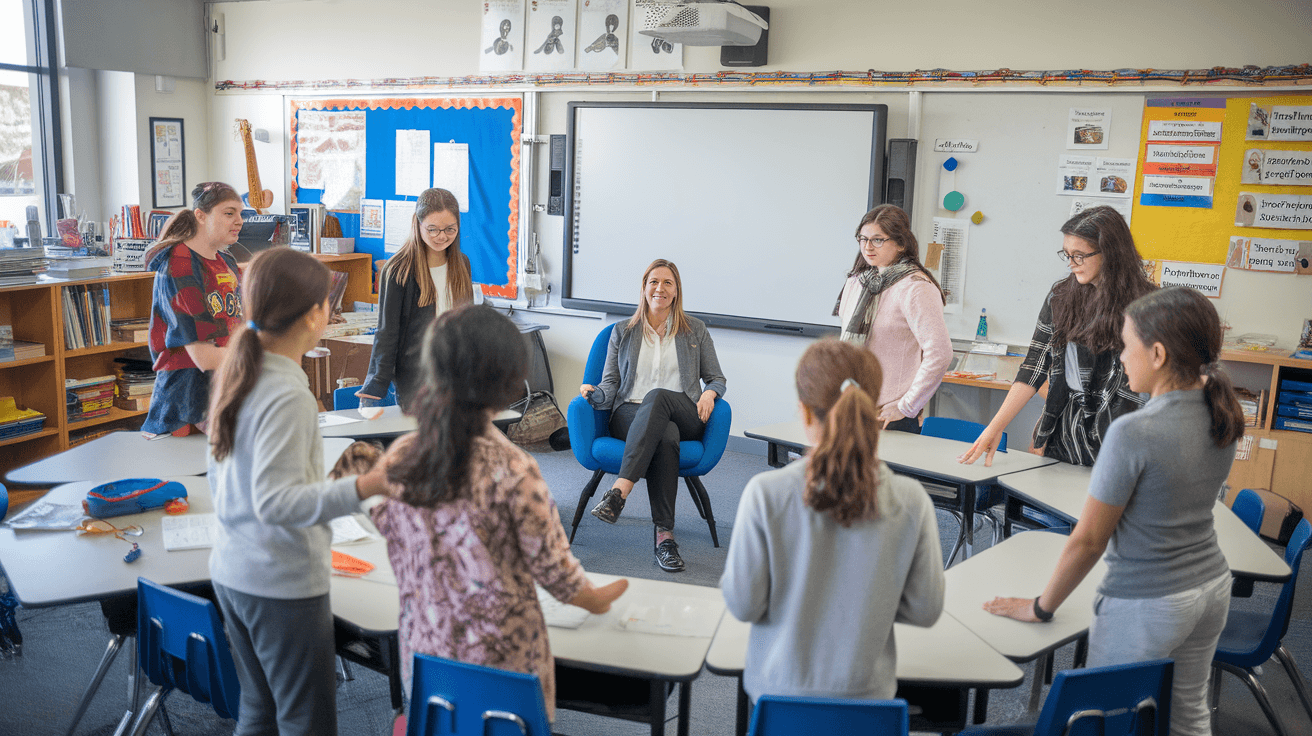We know how tough it can be to keep students interested in class.
Getting them to talk and work together is key, but creating new ideas can be challenging. That’s where role plays come in handy. They’re a great way to make learning fun and get students chatting.
We’ve got your back with 27 role-play ideas that will spark student interaction. These activities will help boost confidence, improve language skills, and create a lively classroom atmosphere.
In this post, we’ll walk you through various engaging role plays. From everyday situations to fantasy scenarios, we’ve got something for every age group and subject.
Let’s explore and make your lessons more interactive!
Everyday Scenarios Ideas
1. Grocery Shopping

Benefit to Students
This role-play helps students practice everyday vocabulary and phrases, enhancing their ability to interact in real-life shopping situations. They learn how to find items, ask for assistance, and handle payments, which builds their confidence in managing daily tasks independently.
How It Can Be Played
- Assign roles: shoppers, cashiers, and store clerks.
- Set up a mock grocery store with items and price tags.
- Practice finding products, asking for help, and paying for purchases.
2. At the Doctor’s Office

Benefit to Students
Students gain experience communicating symptoms, understanding medical vocabulary, and learning how to express health concerns. This role play encourages them to become comfortable in healthcare settings, improving their ability to navigate real-life medical appointments.
How It Can Be Played
- One student acts as the doctor, another as the patient.
- The patient describes their symptoms, and the doctor suggests treatments.
- Incorporate medical tools like stethoscopes and thermometers for realism.
3. Visiting the Post Office
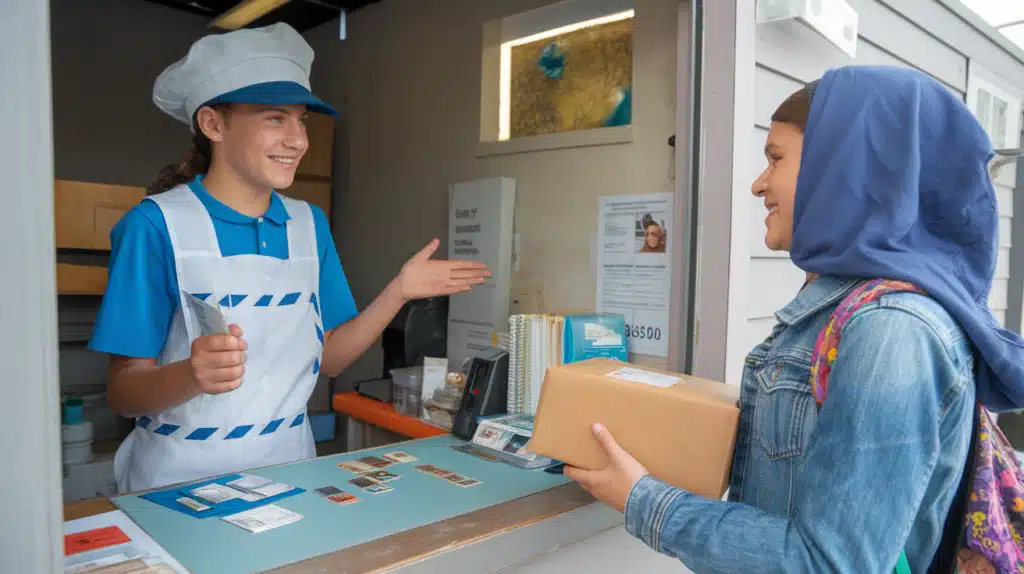
Benefit to Students
This role-play helps students understand postal services, including how to mail a letter or package. They learn the steps involved in sending mail, which enhances their knowledge of communication and logistics.
How It Can Be Played
- Set up a mock post office with envelopes, packages, and stamps.
- Assign roles: postal clerk and customers.
- Practice mailing a letter or package, including addressing and postage.
4. Ordering at a Café
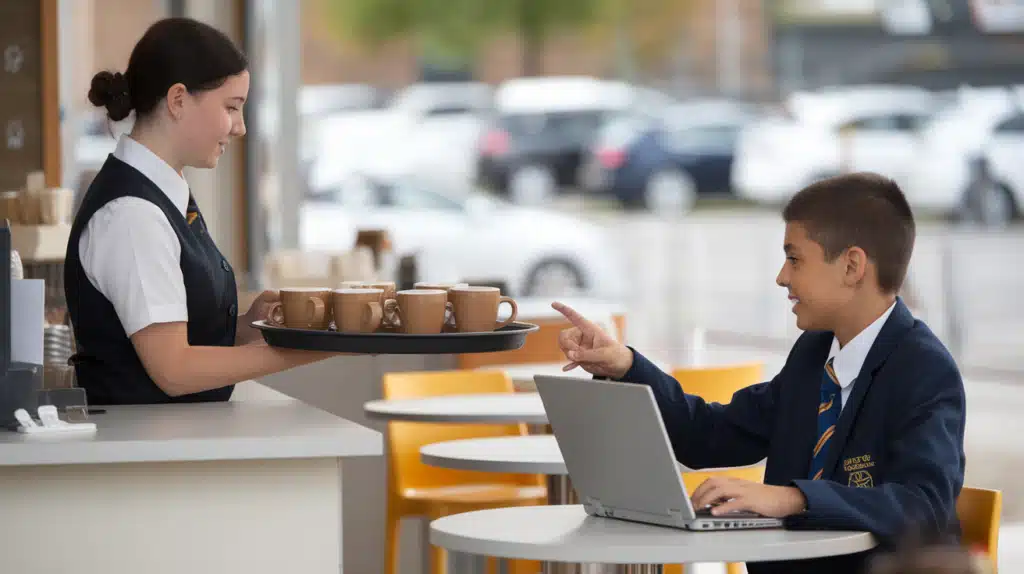
Benefit to Students
Students practice ordering food and drinks, focusing on politeness and correct vocabulary. This role play builds their confidence in dining out and helps them navigate menus and make polite requests.
How It Can Be Played
- Create a simple café menu with coffee, sandwiches, and desserts.
- Assign roles: customer, waiter, and cashier.
- Practice ordering, serving, and paying for items.
5. Library Visit

Benefit to Students
This role play teaches students how to interact in a library setting, including asking for book recommendations and following library rules. It encourages a love for reading and familiarizes them with library etiquette and procedures.
How It Can Be Played
- Set up a mock library with books and a checkout system.
- Assign roles: librarian, library assistant, and patron.
- Practice asking for help finding books and checking them out.
Emergency and Problem-Solving Ideas
6. Fire Drill
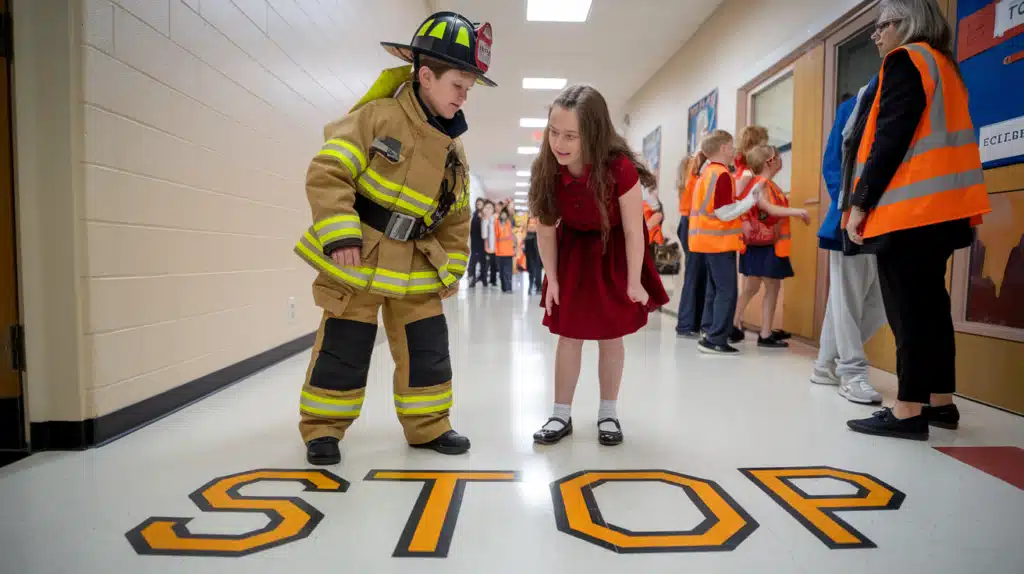
Benefit to Students
This role play prepares students for real-life emergencies, teaching them how to remain calm and follow safety protocols during a fire drill. It helps them understand the importance of evacuation procedures and ensures they know what to do in an emergency.
How It Can Be Played
- Assign roles: students, teachers, and safety officers.
- Practice evacuating the building in an orderly fashion.
- Discuss the importance of fire safety and designated meeting points.
7. Lost in The Mall

Benefit to Students
Students learn problem-solving skills and how to seek help when lost in a public place. This role-play helps them practice asking for directions and staying calm in stressful situations, which is vital for their safety.
How It Can Be Played
- One student acts as a lost child, and another as a security guard.
- The child describes their situation, and the guard helps them find their parents.
- Include scenarios like calling the parents or describing their appearance.
8. Broken Down Car
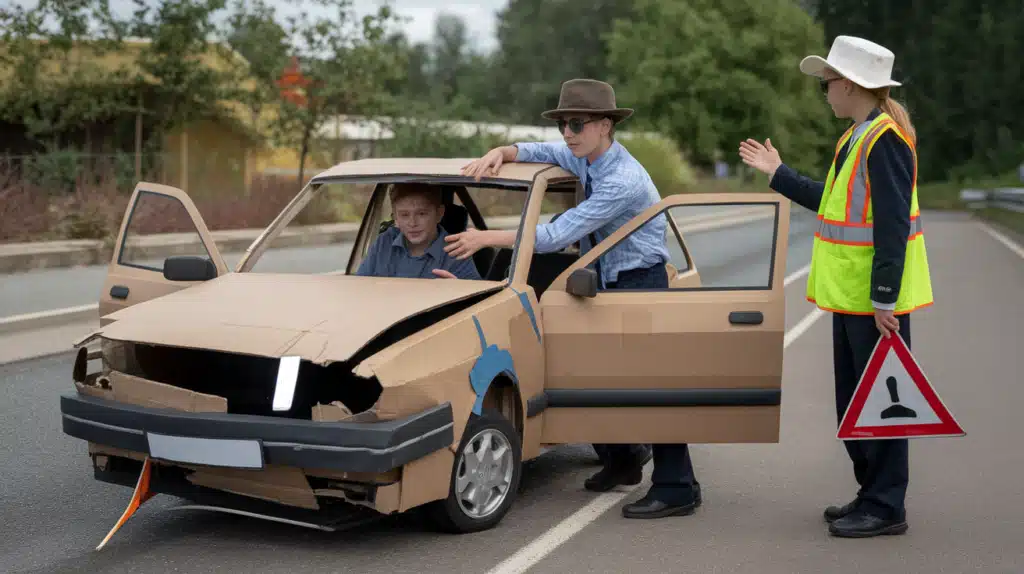
Benefit to Students
This role play teaches students how to handle unexpected situations like car breakdowns. They learn how to communicate effectively with roadside assistance and the steps to take when faced with a vehicle problem, promoting independence and resourcefulness.
How It Can Be Played
- Assign roles: driver, passenger, and roadside assistance.
- The driver explains the car’s issue, and the assistant provides guidance.
- Practice calling for help and describing the car’s location and problem.
9. Power Outage

Benefit to Students
Students learn to adapt to situations without electricity, fostering creativity and problem-solving skills. This role play encourages them to think about alternative ways to complete tasks and stay safe during a power outage.
How It Can Be Played:
- Simulate a power outage in the classroom or at home.
- Discuss how to handle food storage, lighting, and communication without electricity.
- Assign tasks like finding flashlights or preparing a meal without electricity.
10. First Aid Response
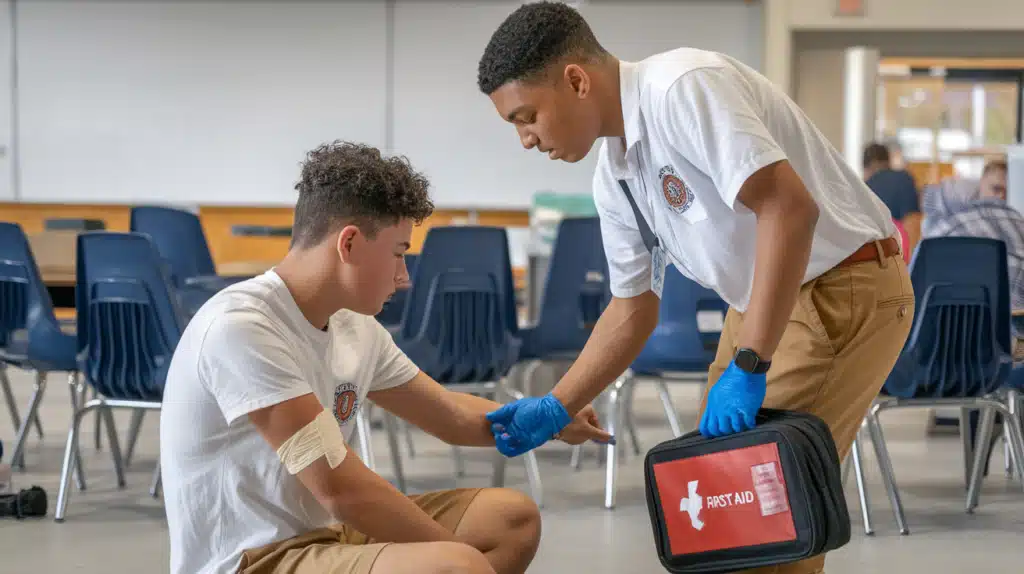
Benefit to Students
This role play equips students with basic first-aid knowledge, teaching them how to respond to minor injuries and emergencies. It fosters a sense of responsibility and empowers them to act effectively in real-life situations where first aid is needed.
How It Can Be Played:
- Assign roles: injured person and first aid responder.
- The responder practices applying bandages, using ice packs, and calling for help.
- Include scenarios like treating a cut, sprain, or burn.
Professional and Career-Oriented Ideas
11. Job Interview

Benefit to Students
Students practice professional English, proper interview etiquette, and how to respond to common interview questions confidently. This role-play helps them prepare for real-life job interviews, improving their chances of success in the job market.
How It Can Be Played
- Assign roles: interviewer and interviewee.
- The interviewee answers questions about their skills, experience, and goals.
- Practice different types of interviews, such as for a part-time job or internship.
12. Running a Business Meeting
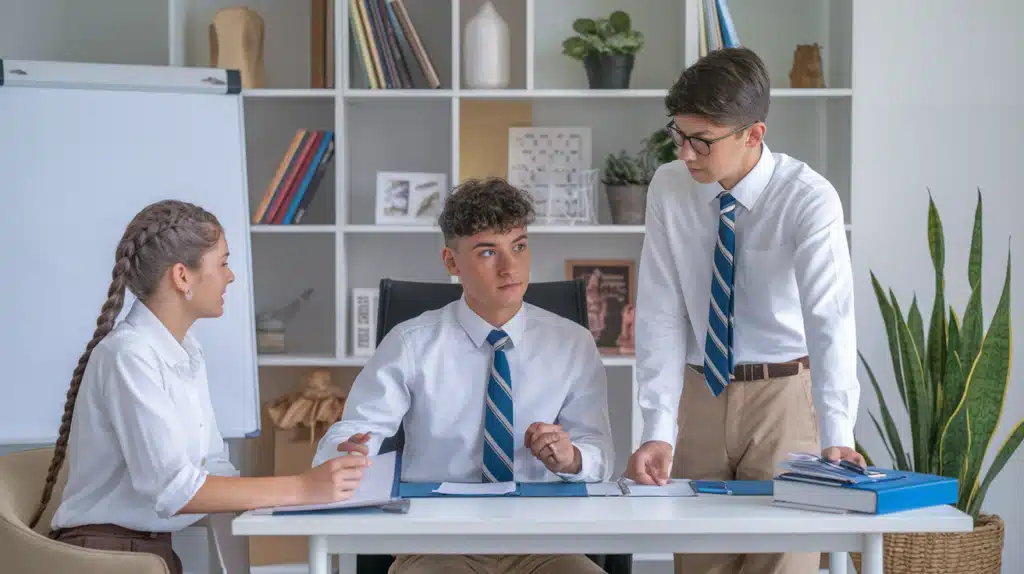
Benefit to Students
This role play teaches students how to conduct and participate in business meetings. They learn to present ideas, take notes, and make decisions collaboratively, which is essential for their future professional lives.
How It Can Be Played
- Assign roles: manager, team members, and secretary.
- Discuss a business project, set goals, and allocate tasks.
- Practice opening the meeting, discussing agenda items, and concluding the meeting.
13. TV News Anchor
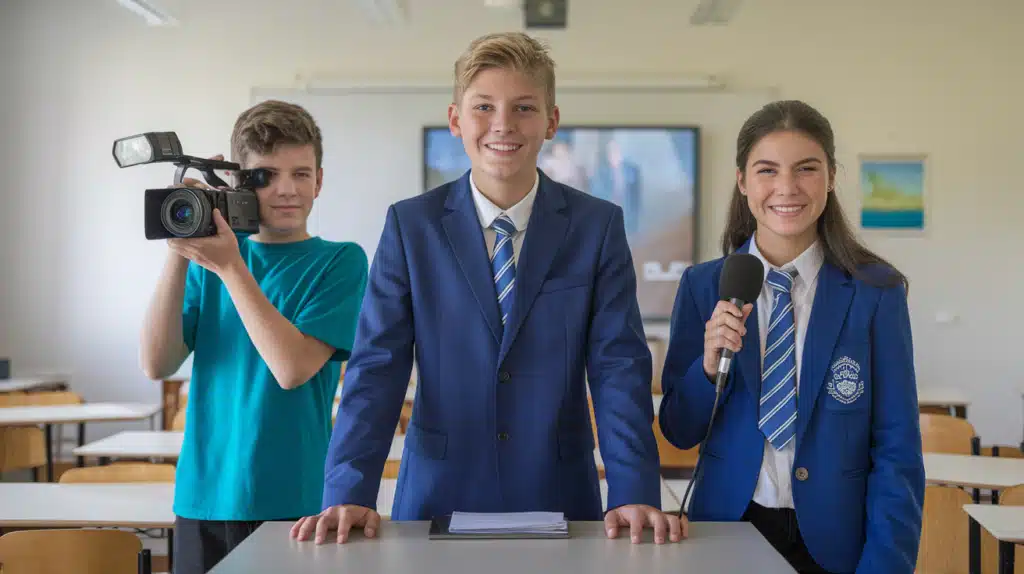
Benefit to Students
Students practice public speaking, clear articulation, and professionalism by role-playing as news anchors. This activity improves their confidence in presenting information and enhances their communication skills, which are essential for media-related careers.
How It Can Be Played
- Set up a mock TV studio with a news desk and microphone.
- Assign roles: news anchor, reporter, and cameraman.
- Practice reading news scripts, reporting on location, and interviewing witnesses.
14. Flight Attendant and Passenger
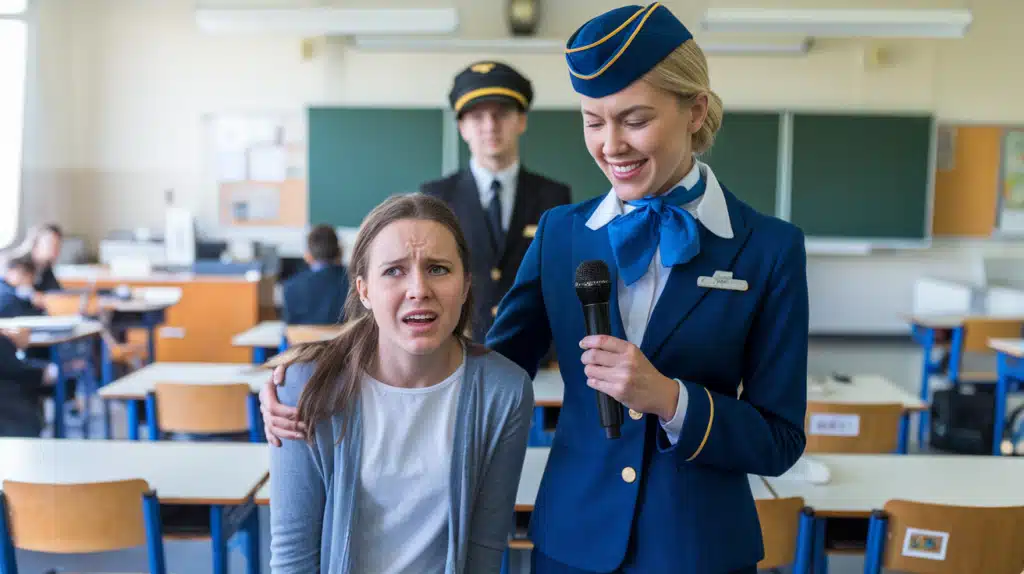
Benefit to Students
Students learn about customer service and safety procedures through this role play. It helps them understand the responsibilities of a flight attendant and how to interact politely with passengers, which is useful for those interested in the travel industry.
How It Can Be Played
- Assign roles: flight attendant, passengers, and pilot.
- Practice in-flight announcements, serving refreshments, and handling passenger requests.
- Include emergency scenarios like turbulence or a medical situation.
15. Office Worker

Benefit to Students
This role play introduces students to an office worker’s daily tasks and responsibilities. They practice organizational skills, time management, and communication, which are essential for success in any office environment.
How It Can Be Played
- Set up a mock office with desks, computers, and phones.
- Assign tasks like filing, answering phone calls, and typing emails.
- Practice handling different scenarios like a busy workday or an urgent deadline.
Creative and Fantasy Ideas
16. Superheroes Saving the Day
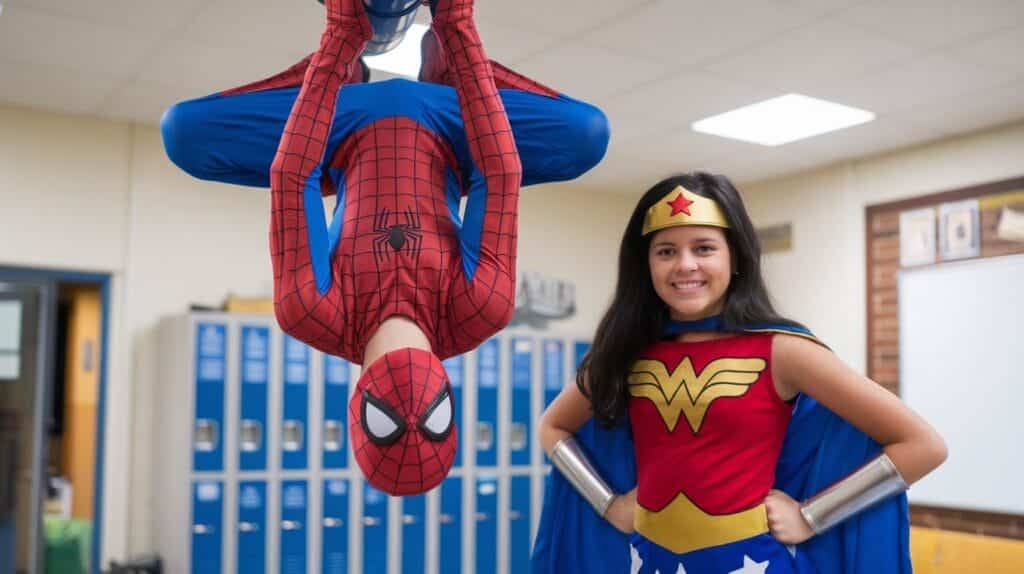
Benefit to Students
This role play encourages creativity and teamwork as students create their own superheroes and solve a crisis. It enhances their problem-solving skills and helps them develop a sense of responsibility and leadership.
How It Can Be Played
- Students create their superhero characters with unique powers.
- Assign a crisis scenario for the superheroes to solve.
- Work together as a team to plan and execute the solution.
17. Medieval Castle
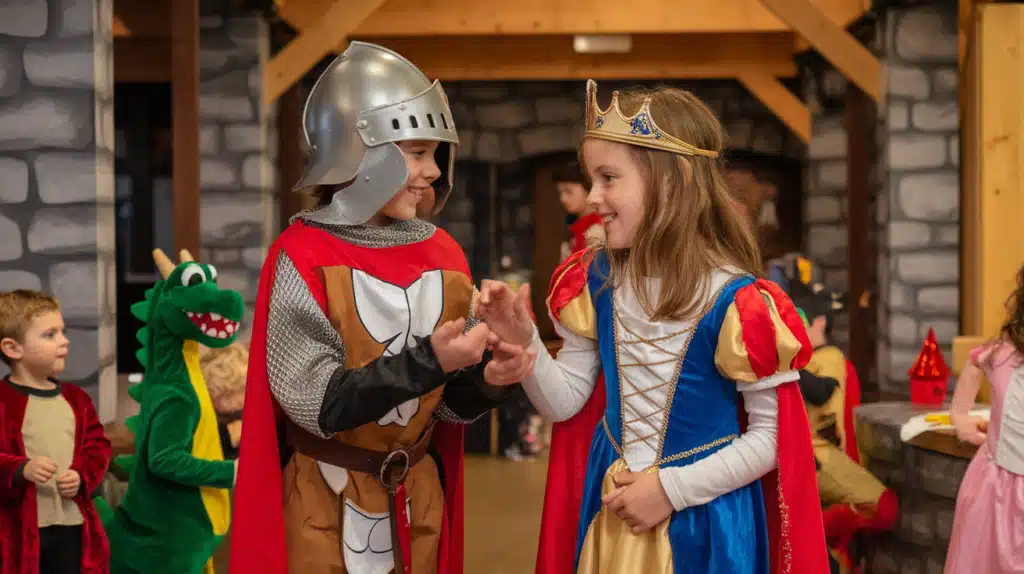
Benefit to Students
Students explore historical settings and characters, fostering their imagination and understanding of history. This role play allows them to create stories of bravery, honor, and adventure, enriching their narrative skills.
How It Can Be Played
- Assign roles: knights, princesses, dragons, and castle inhabitants.
- Set up a castle scene with props like swords, shields, and crowns.
- Create a storyline involving a quest or battle to protect the castle.
18. Space Mission

Benefit to Students
This role play takes students on an imaginative journey to space, where they encounter challenges that require teamwork and critical thinking. It enhances their knowledge of space exploration and inspires interest in science.
How It Can Be Played
- Assign roles: astronauts, mission control, and space tourists.
- Create scenarios like landing on Mars or repairing a space station.
- Practice problem-solving and communication in a zero-gravity environment.
19. Pirate Treasure Hunt
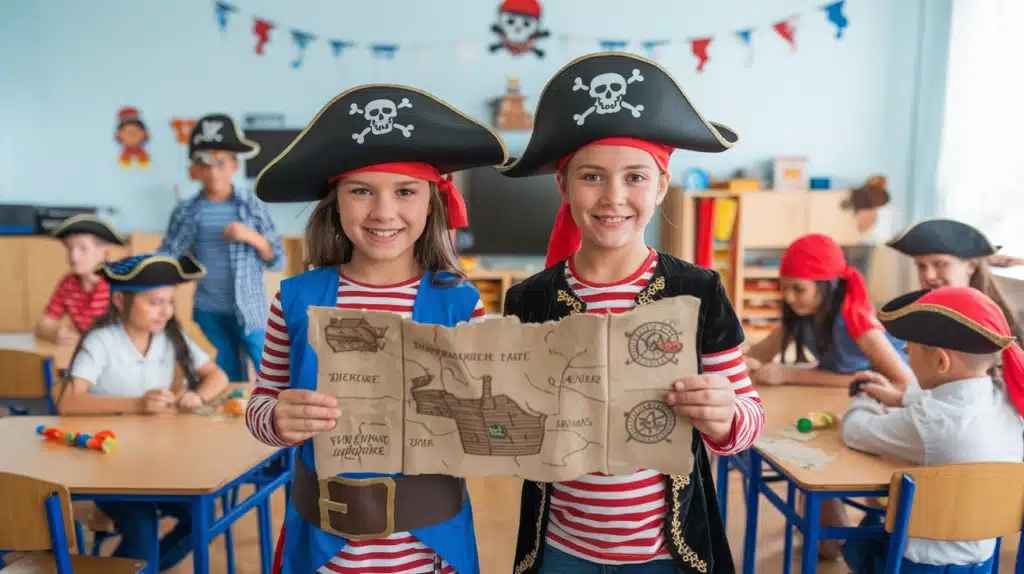
Benefit to Students
Students engage in a fun and adventurous role play, searching for hidden treasure. This activity enhances their map-reading skills, teamwork, and strategic thinking, all while immersing them in a creative and imaginative world.
How It Can Be Played
- Assign roles: pirates, captains, and crew members.
- Create a treasure map with clues leading to hidden treasure.
- Work together to solve the clues and find the treasure.
20. Time Travel Adventure
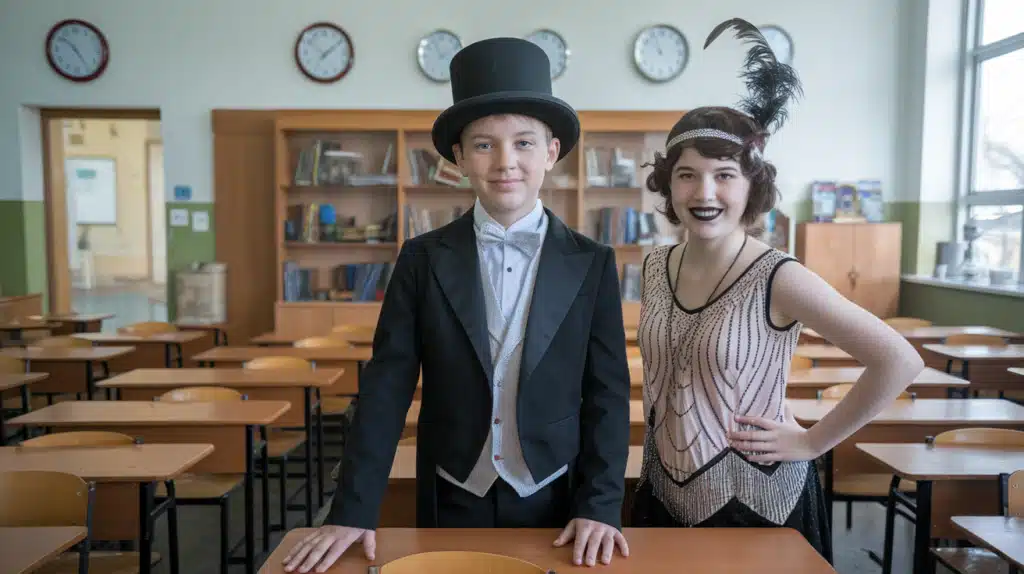
Benefit to Students
Students explore different historical periods through this role play, enhancing their understanding of history and cultural diversity. It encourages them to think critically about how the past influences the present and future.
How It Can Be Played
- Assign roles: time travelers and historical figures.
- Choose different time periods to visit, such as ancient Egypt or the Renaissance.
- Create scenarios where the travelers interact with historical events or figures.
Cultural and Historical Ideas
21. Ancient Egyptian Marketplace
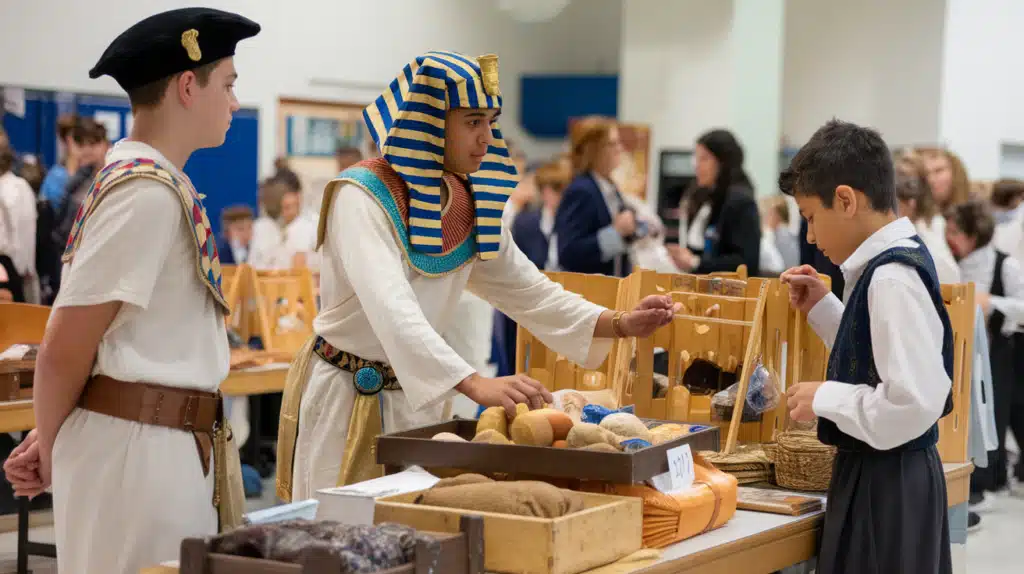
Benefit to Students
Students learn about ancient cultures and trade practices by role-playing in an ancient Egyptian marketplace. This activity enhances their understanding of history and economics, as well as their ability to negotiate and communicate effectively.
How It Can Be Played:
- Assign roles: merchants, buyers, and market guards.
- Set up a market with goods like spices, fabrics, and jewelry.
- Practice bartering and trading goods using historical currency and language.
22. First Contact with Aliens
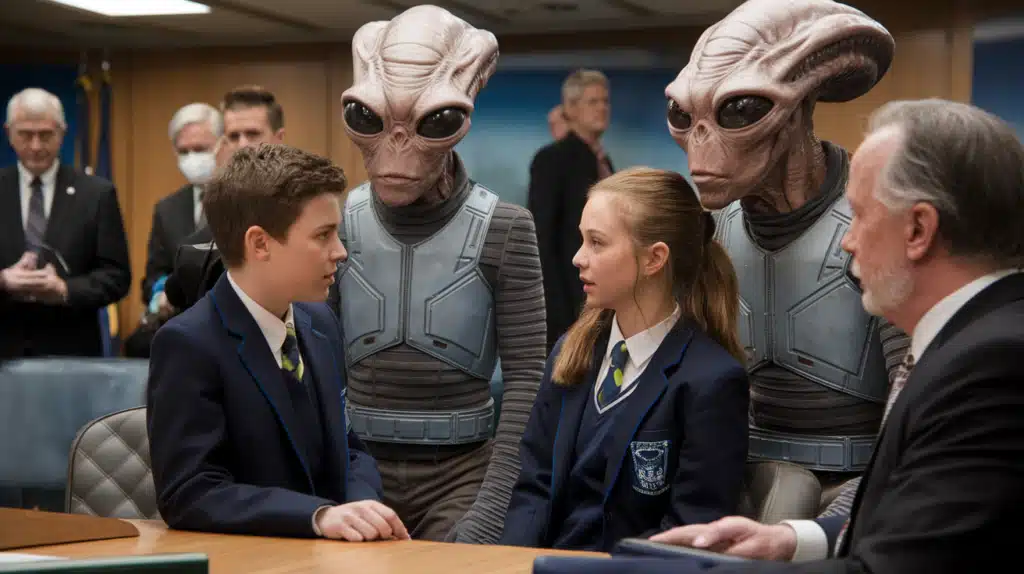
Benefit to Students
This imaginative role play allows students to explore the concept of communication and diplomacy with extraterrestrial beings. It encourages them to think creatively about language, culture, and the challenges of understanding others.
How It Can Be Played
- Assign roles: humans, aliens, and diplomats.
- Create a scenario where humans meet aliens for the first time.
- Practice communicating with the aliens and negotiating peaceful relations.
23. Colonial America Town Hall

Benefit to Students
Students step into the shoes of early American settlers and discuss issues in a town hall meeting. This role-play helps them understand the political and social dynamics of colonial America and the importance of civic participation.
How It Can Be Played
- Assign roles: town officials, settlers, and Native American representatives.
- Discuss issues like land disputes, taxation, and trade.
- Practice making speeches, debating, and voting on decisions.
24. World War II Resistance Fighters
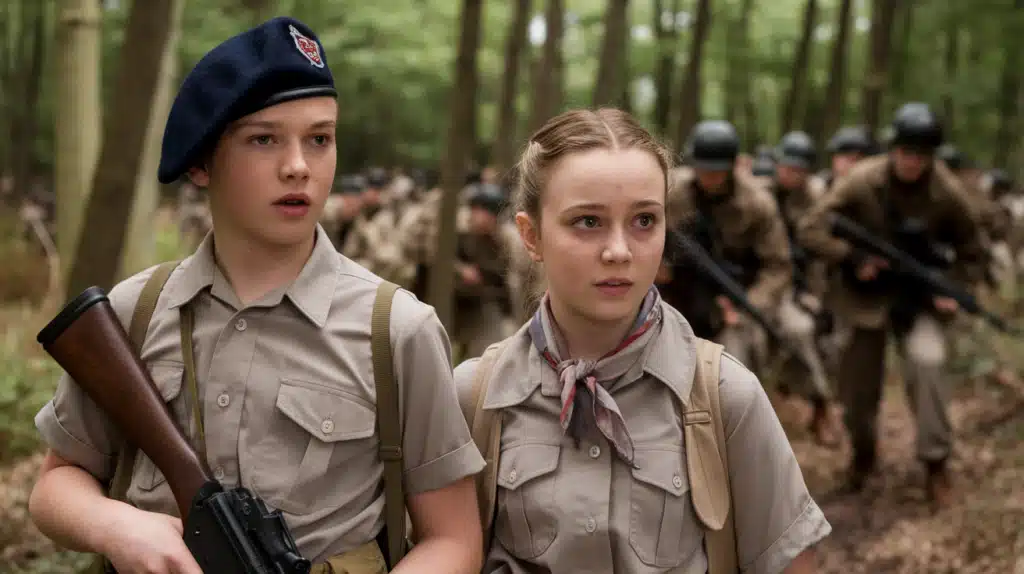
Benefit to Students
This role play immerses students in a historical setting, where they take on the roles of resistance fighters during World War II. It teaches them about bravery, sacrifice, and the complexities of war, fostering empathy and historical awareness.
How It Can Be Played
- Assign roles: resistance fighters, spies, and enemy soldiers.
- Create scenarios like sabotaging enemy plans or rescuing prisoners.
- Practice strategic thinking, teamwork, and moral decision-making.
25. Cultural Festival Celebration
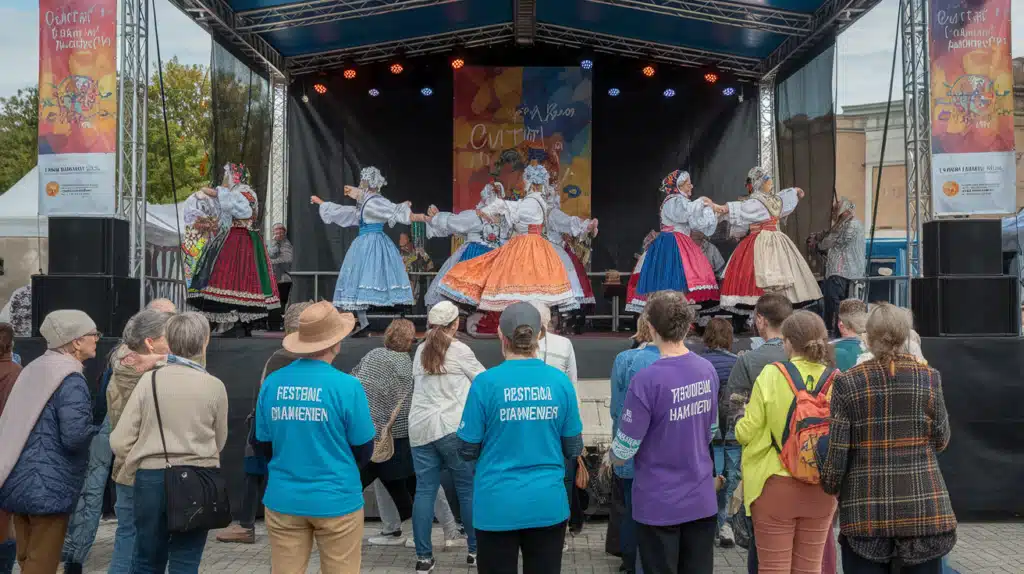
Benefit to Students
Students learn about different cultures by role-playing in a multicultural festival. This activity promotes cultural awareness, respect for diversity, and understanding of global traditions, helping them appreciate the richness of the world’s cultures.
How It Can Be Played
- Assign roles: festival organizers, performers, and visitors.
- Set up booths representing different cultures with food, music, and crafts.
- Practice sharing information about each culture and participating in the festivities.
Social and Ethical Scenario Ideas
26. Bullying Prevention

Benefit to Students
This role play empowers students to resist bullying by teaching them how to recognize and address it. It promotes empathy, assertiveness, and conflict resolution skills, helping to create a safer and more supportive school environment.
How It Can Be Played
- Assign roles: bully, victim, and bystander.
- Create scenarios where students practice intervening in bullying situations.
- Discuss the importance of reporting bullying and supporting peers.
27. Volunteering at a Shelter
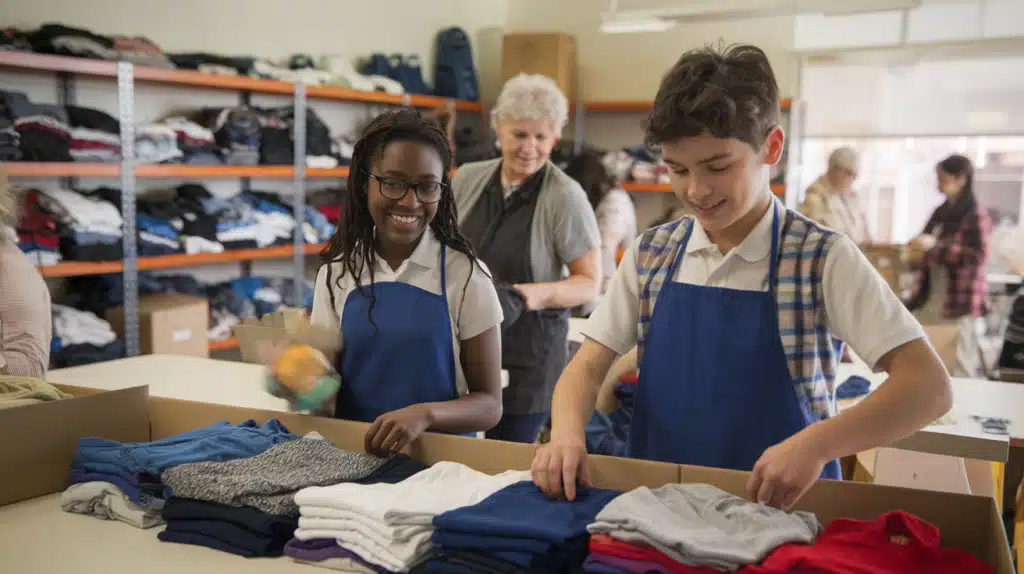
Benefit to Students
Students learn about compassion, empathy, and social responsibility by role-playing as volunteers at a shelter. This activity encourages them to think about how they can contribute to their community and positively impact it.
How It Can Be Played
- Assign roles: shelter staff, volunteers, and residents.
- Create scenarios like organizing a food drive or assisting those in need.
- Practice teamwork and communication while helping others.
Conclusion
Let’s wrap up our chat about role plays in the classroom. We’ve explored 27 fun ways to get students talking and working together.
These activities do more than liven up your lessons – they help build key skills like speaking, listening, and problem-solving.
Remember, the goal is to create a space where students feel comfortable expressing themselves. As you try out these role plays, you might need to tweak them to fit your class.
That’s okay! The best learning happens when students are engaged and having fun.
We hope these ideas spark your creativity and inspire you to bring more interactive elements into your teaching.
Your students will thank you for it. Happy teaching, and here’s to more laughter and learning in your classroom!

